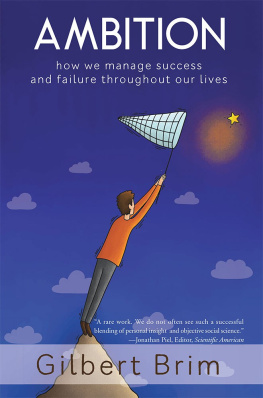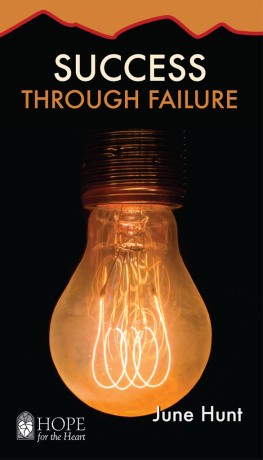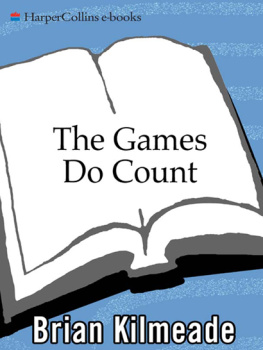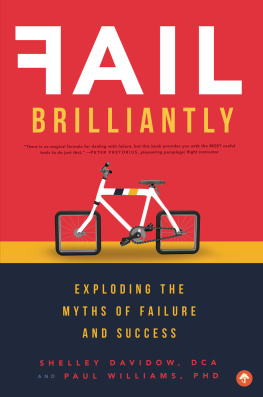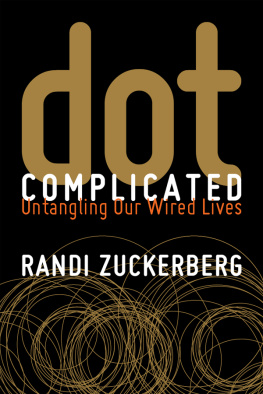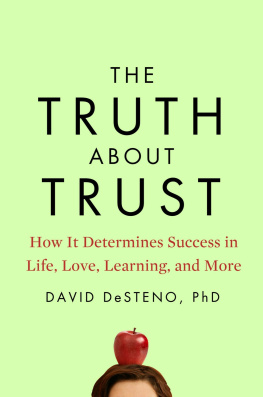Ambition
HOW WE MANAGE SUCCESS AND
FAILURE THROUGHOUT OUR LIVES
GILBERT BRIM

AMBITION
HOW WE MANAGE SUCCESS AND FAILURE THROUGHOUT OUR LIVES
Copyright 2016 Gilbert Brim.
All rights reserved. No part of this book may be used or reproduced by any means, graphic, electronic, or mechanical, including photocopying, recording, taping or by any information storage retrieval system without the written permission of the author except in the case of brief quotations embodied in critical articles and reviews.
iUniverse
1663 Liberty Drive
Bloomington, IN 47403
www.iuniverse.com
1-800-Authors (1-800-288-4677)
Because of the dynamic nature of the Internet, any web addresses or links contained in this book may have changed since publication and may no longer be valid. The views expressed in this work are solely those of the author and do not necessarily reflect the views of the publisher, and the publisher hereby disclaims any responsibility for them.
Any people depicted in stock imagery provided by Thinkstock are models, and such images are being used for illustrative purposes only.
Certain stock imagery Thinkstock.
ISBN: 978-1-4917-9286-5 (sc)
ISBN: 978-1-4917-9287-2 (e)
iUniverse rev. date: 03/17/2016
Designed by Ellen Levine
I wish to express my gratitude for permission to quote from:
The lines from Greed (translated by Stanley Kunitz) are reprinted from Life Sentence, Selected Poems, by Nina Cassian, edited by William Jay Smith, by permission of W. W. Norton & Company, Inc. Copyright 1990 by Nina Cassian.
The Armful from The Poetry of Robert Frost , edited by Edward Connery Lathem. Copyright 1928, 1969 by Holt, Rinehart and Winston. Copyright 1956 by Robert Frost. Reprinted by permission of Henry Holt and Company, Inc.
As I Walked Out One Evening from W. H. Auden: Collected Poems , by W. H. Auden, edited by Edward Mendelson. Copyright 1940 and renewed 1968 by W. H. Auden. Reprinted by permission of Random House, Inc.
Friday, August 1: Murphys Sixth Corollary: Whenever you set out to do something, something else must be done first. Reprinted from Murphys Law Desk Calendar , by Arthur Bloch. 1977, 1982, 1984, 1985, with permission from Price Stern Sloan, Inc., Los Ang eles.
Contents
Many friends helped in the creation of this book by giving steady encouragement and directions to important information, by reading various drafts along the way and responding with honest feedback and usable suggestions, and by occasionally providing an apt turn of phrase. I am especially grateful to: Paul B. Baltes, Paul Cleary, Howard E. Freeman, David A. Goslin, Judith Greissman, Patricia B. Gurin, Mary Agnes Hess, Margie E. Lachman, Wilbert J. McKeachie, Robert K. Merton, John Robert Newbrough, Alice S. Rossi, Carol D. Ryff, Richard Shweder, and Heidi Sigal.
Anne Rosenfeld drew on her wide experience as a professional editor to transform many awkward psychological paragraphs into statements that now are more interesting and pleasant to read. Martin Kessler at Basic Books found the time, in addition to his roles as president and editor-in-chief, to carry out an invaluable personal editing of the manuscript. Phoebe Hoss, the developmental editor, did the last line-by-line editing and correcting, along with some rewriting and rearranging to give the book its final polish.
At the beginning, Joan Pifer typed, formatted, and put in order the first, rough versions of the manuscript. Camille Yezzi typed a subsequent draft during one pivotal year. In the final writing, over a three-year period, Barbara Van Zandt, assisted by Brenda Theall, typed and corrected successive revisions with grace and dedication. My thanks to these close companions.
Thanks are due to the Social Science Research Council for my participation in a December 1983 conference in Santa Barbara on Winning and Losing, where I first presented my ideas for this book, and I will always be indebted to the Russell Sage Foundation, which awarded me a year as a Visiting Scholar in 1985-86 so that I could begin my writing.

My Fathers Windowbox
My father was one hundred and three years old when he died several summers ago. He grew up on a farm in Ohio and was the only one of seven children to leave farming, finding his way through complicated paths to Harvard and to Columbia, getting his Ph.D. with John Dewey (in rural education), and teaching at Ohio State University until he was sixty. Then he and my mother bought an old abandoned farm of several hundred acres in northwest Connecticut, remodeled the house, and moved there to live.
He set about to clean the fence rows and to clear the woods the way he had been taught to do as a boy in Ohio. For many years he roamed the hillsides and mountaintop, thinning trees, trimming brush, and taking pride in looking up from the porch at his clean and tidy mountain. As he grew older, his legs and back would tire earlier in the day, and sometimes he would get a friend to help him or hire a young man to work with him to keep up the place.
Over the years, almost unnoticeably, the upper part of the mountain was no longer within his range; and gradually his level of aspiration lowered, coming down the hillside, so to speak, into the trees and land around the house with a new and large investment of energy in gardening, both vegetables and flowers.
At one time, when he had plots of asparagus and rows of raspberries and fields of gladioli, he would supply his friends throughout the northwest corner of Connecticut with armloads of glads, as he called them. He cultivated his crops with a power tiller much like a lawnmower. Later, as it became harder for him to bear down on the handles to lift the tillers front end to turn, the width between the rows grew larger. On his ninetieth birthday, he bought a small riding tractor.
One year he did not plant the gardens, and his attention turned to the little border flowers around the house and to four large outdoor windowboxes. At waist height, they required no knee bending to cultivate. The windowboxes served well for years, but then his failing sight and muscular strength meant that he could not tend even these without great effort. In the end, the tree work, farm work, and gardening all were given up. But he focused on a new activity: listening to talking booksnovels, biographies of great poets, and a good sampling of the worlds drama.
After a few minor strokes during his one hundred and second year, he could not see well enough to deal with television or hear well enough to use the talking books. His windowboxes were still there, and he would go outdoors to see them, dimly. He felt the soil and watered them when needed. Although planted by someone else, they still were his achievements. He would file his garden tools, especially his hoe, to keep them sharp; it was easy to do by touch.
Having seen the scope of his life shrink dramatically to its narrow compass (Theres so little left of me, he said), he told me he would like to leavebut not through his own action; he was waiting, and hoping.
This man was as happy and fulfilled at one hundred and one as he was at age sixty. In dealing with the gaps between his desires and achievements, he had an unyielding drive for growth and mastery, a rational mind, and a capacity for change. But these traits were not unique to my father; they are part of every human being.
This book is about human nature and ambition. It is about how we deal with our successes and failures in day-to-day life; about how we respond to winning and losing so that we keep growing and changing throughout our lives. It is about our ambition through lifeabout how we maintain it, how we increase it, how we control it, how we get rid of it. It is about what happens to us and our youthful dreams.
Next page
